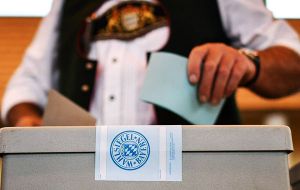MercoPress. South Atlantic News Agency
Bavaria's CSU loses its majority in regional election; blow for Merkel's coalition
 Party leader Horst Seehofer said it was “not a nice day”, but only “one side of the coin”: vote gives “a clear mandate” allowing the CSU to form a new government
Party leader Horst Seehofer said it was “not a nice day”, but only “one side of the coin”: vote gives “a clear mandate” allowing the CSU to form a new government  Exit polls for major broadcasters said the CSU (Christian Social Union) won about 37% of the vote, down 10 points on four years ago
Exit polls for major broadcasters said the CSU (Christian Social Union) won about 37% of the vote, down 10 points on four years ago  The left-leaning pro-immigration Greens reached 18% and the Alternative for Germany (AfD) came fourth with 10%, behind the collective Free Voters
The left-leaning pro-immigration Greens reached 18% and the Alternative for Germany (AfD) came fourth with 10%, behind the collective Free Voters Angela Merkel's sister party has suffered massive losses in Bavaria's state elections, exit polls suggest, in a blow to the German chancellor. The CSU is set to lose its absolute majority in the state parliament, while the Greens surged into second place and the anti-immigration AfD entered the state parliament for the first time.
The CSU has ruled Bavaria almost single-handedly since 1957, but has lost support as opinion becomes polarized over issues like migration.
Party leader Horst Seehofer said it was “not a nice day”, but added it was only “one side of the coin” as the vote gives “a clear mandate” allowing the CSU to form a new government.
Exit polls for major broadcasters said the CSU (Christian Social Union) won about 37% of the vote, down 10 points on four years ago, with the left-leaning pro-immigration Greens on 18%.
The Alternative for Germany (AfD) came fourth with 10%, behind a collective of independent candidates known as the Free Voters.
Merkel's national coalition partners the centre-left Social Democrats (SPD) trailed in fifth with less than 10%, their vote halved. There is speculation that it could pull out of the government in an attempt to survive as a party. Its leader Andrea Nahles, blamed the poor performance in Bavaria on squabbling within the coalition.
The AfD's success in Bavaria has not been as great as in eastern Germany, but it appears to have taken large numbers of votes from the CSU. But by echoing some of the AfD's hardline policies such as on migration, the CSU also seems to have lost the support of more moderate voters.
The CSU's Markus Söder, current Bavarian prime minister, said the projected result was painful but the party should learn from it.
“We have to analyze the changes taking place both in Bavaria and in society,” he said.
“One of the most important jobs we now have is to ensure that this state is stable, governable, and remains as strong as it is now.”
Bavaria has nearly 13 million residents and the biggest by area of Germany's 16 federal states. Its capital Munich is Germany's third-largest city, after Berlin and Hamburg. Bavaria has the second-highest GDP out of 16 German states. Historically it has been a conservative region, with strong Catholic and local traditions but also an industrial powerhouse: car and IT sectors especially strong, rich in family-run firms.
The poll is a serious setback for Mrs. Merkel, just months after she formed a fragile coalition with the CSU and SPD - both of whom suffered huge losses in Bavaria.




Top Comments
Disclaimer & comment rules-

-

-

Read all commentsToo late now. The social damage Merkel has inflicted on Germany is already done and irreversible.
Oct 15th, 2018 - 09:29 pm 0I know this sounds conspiratorial, but the people advising her to add almost a million refugees to the german overpopulation must have been paid off by Russia or China to do so, or to keep quiet about it.
You couldn't just start out with inviting 50,000 refugees, for starters? You had to invite a million. And even after that debacle, Merkel still did not want to curb her immigration impulses.
It is unexplainable to me, except for some quirky explanation like the above.
The low birthrate and falling number of working age people in Germany might have something to do with it? They needed more workers to pay their pensions, and once they started letting them in, they couldn't easily stop. I thought Cameron's plan to take refugees directly from the camps was much better than letting them come across the border uncontrolled.
Oct 15th, 2018 - 10:25 pm -1Merc is a political vampire.
Oct 16th, 2018 - 12:38 am -1It's going to take a stake through her atheist heart to get her out of government.
Commenting for this story is now closed.
If you have a Facebook account, become a fan and comment on our Facebook Page!